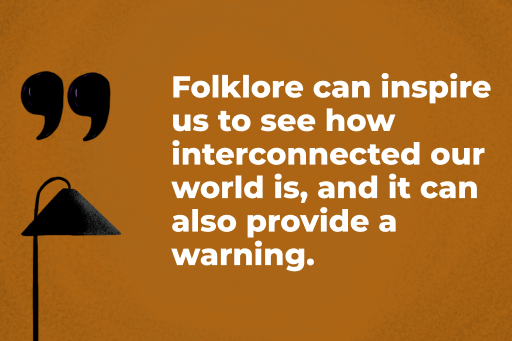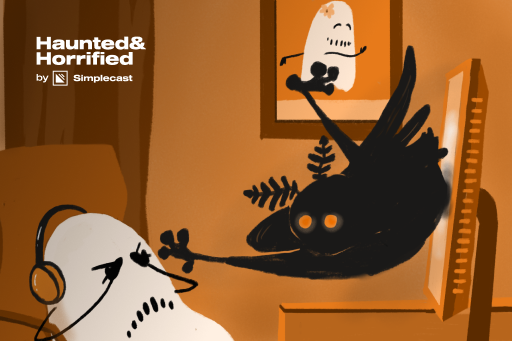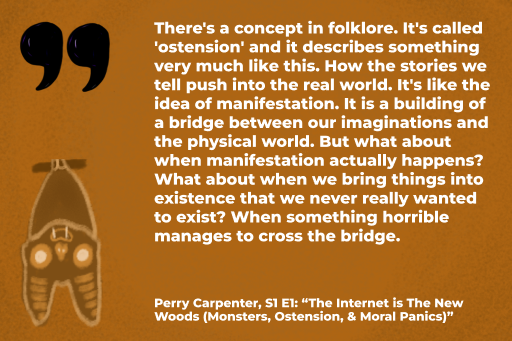Entertainment
Related articles:
I, like many Millennials who have been regularly online since childhood, am well acquainted with creepypasta and viral email chains warning parents of needles in their Halloween candy. I am aware of the Satanic Panic, LARPing, fanfiction, conspiracy forums, and ARGs. I am also ravenous for academic perspectives that take these issues seriously. I love hearing from people who think about how storytelling across media impacts us collectively.
Digital Folklore is “[a]n immersive audio adventure that takes place inside a fictional universe, but explores the real-world truths behind the various expressions of internet culture and how each holds up a mirror to the society from which they emerge.” The show uses fictional depictions of the hosts to guide listeners through their own folkloric adventures as well as interviews with academics and experts on fields spanning the internet, pop culture, folklore, religion, and psychology. A number of their guests are from the Folklore Studies department at George Mason University–an increasingly defunded area of study despite what this very podcast showcases: that the study of folklore is intrinsic to understanding ourselves and our communities.
I was first drawn to the premise of Digital Folklore due to my own fascination with the realm of the digital storytelling, and what the creators and the academics interviewed on the show refer to as “ostension”:
In the pilot, the hosts and their guests begin with a lighthearted showcase of popular internet lore in a way that could be seen as playful. Perry Carpenter and Mason Amadeus (the main characters/hosts) get lost in the woods while they discuss tulpas, Slenderman, Momo, and snuff films. In a deft showcase of narrative building, however, they end with tying all these threads together to demonstrate the powerful intersection of moral panic and the United States’ broken justice system.
The guest who really brought the message home for me was Kathleen Hale, author of Slenderman: Online Obsession, Mental Illness, and the Violent Crime of Two Midwestern Girls. In 2014, two twelve-year-old girls attempted to stab their classmate to death. They admitted to the crime, and described their motivation as being under the influence of internet creepypasta figure “the Slenderman”. Like many, I was aware of the incident and of the connection to the story of Slenderman. But while that story ended for many of us nearly a decade ago, it did not end for those who were impacted by this incident. Through this one podcast episode, I was given additional context that I think many people (including myself) missed the first time around. Context that insists we pay attention to why we use fake monsters like Slenderman to ignore the real crisis of mental health in this country.
Digital Folklore’s fresh take on interview storytelling reminded me of the reason I absolutely love podcasts. As a fan and creator of audio drama (or, fiction podcasts), I was also delighted to find that the creators use sound design and scripting techniques from another side of podcasting to craft their episodes. Amadeus is also the show’s sound designer, and has multiple voice acting and fiction podcast credits across the industry. That experience shines through. Each episode includes scripted, fictional–usually comedic–depictions of the hosts as they navigate their interviews as well as strange experiences with digital folklore. This includes running audio gags and hijinks, such as a pet raccoon, wonky wifi connections, abductions, and missing time.
One of my favorite episodes is “S1E3: Hidden Meanings (Haunted Videogames, ARGs, & Folk Groups)”, as it combines the fictional and real in the most wonderfully meta way possible. The episode introduces one of the more interesting sides of internet folklore: augmented reality games (ARGs), essentially multimedia scavenger hunts. Any discussion of ARGs and video games would be remiss without Perry and Mason going down their own rabbit hole and stumbling upon haunted items at their local pawn shop. Not only do they experience ARGs as the fictional hosts, they build upon that meta depiction by inviting listeners to join in with their own hidden clues scattered across the show’s various digital platforms. Personally, I want to see more of this multimedia worldbuilding approach to podcast community building.

There is one area with Digital Folklore I would enjoy hearing them explore more in the coming seasons. I am fascinated by digital folklore and “ostension” in a global context because the internet is, more or less, global. My undergraduate capstone project explored examples of Bollywood movies that directly influenced legal cases and online activism in India. Digital Folklore acknowledges folklore in the U.S. that is connected to Native and Black culture (and acknowledges how folklore can be rooted in and reinforce stereotypes), but most of the episodes focus primarily on European and white American folklore. With a little digging, I noted that there are professors at George Mason University who are experts in folklore outside of the U.S./white/Western/European contexts. How are other countries and cultures developing their own digital folklore?
Even if those at Digital Folklore want to keep their interviews relevant for U.S. audiences, there are a TON of topics that could go broader. I’d love a primer for the relevance of East Asian folklore within Japanese, Korean, and Chinese pop culture that has taken hold in the States, for example. Or a new take on the influence of folklore and practices like African Traditional Religions (ATRs) within the rise of “Black Twitter” (“X”). Or an episode that explores why so much digital folklore in the U.S. takes and remakes Indigenous folklore, or is rooted in anxieties around the people native to this continent.
An academic take on folklore does not have to be stuffy or inaccessible. In fact, it can show us just how constructed and malleable our cultures really are. I love to explore the tattered edge of story and reality, especially in our Internet age. Folklore can inspire us to see how interconnected our world is, and it can also provide a warning. Understanding the impact of folklore on our lives and our reality reminds us about how important it is to be mindful about the stories we tell IRL and online.
Editor's Note: This review is based on the first season of "Digital Folklore" and was drafted when the podcast first released.


